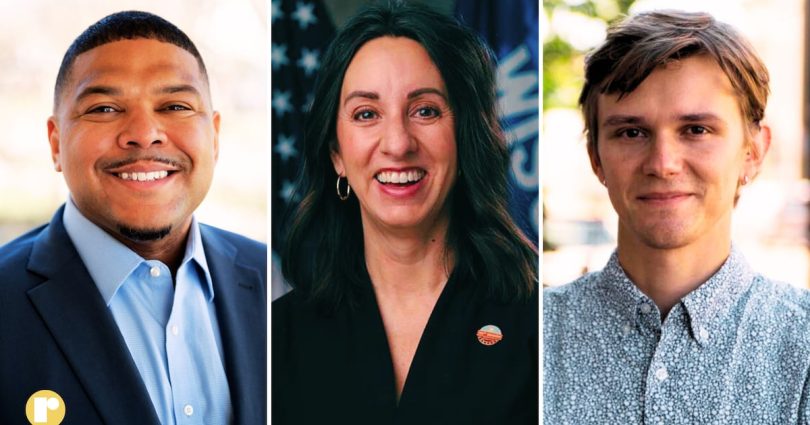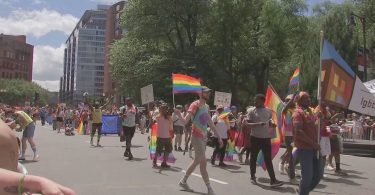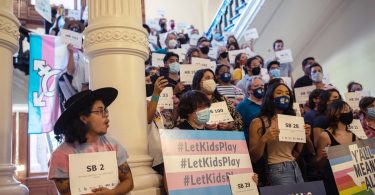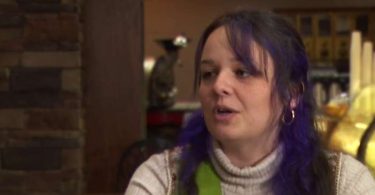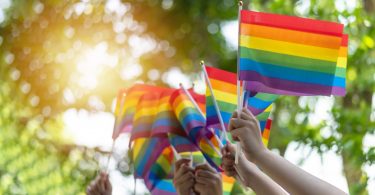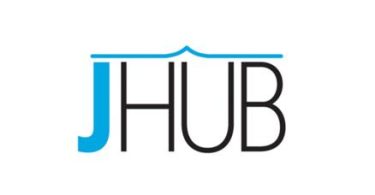Wisconsin might elect its largest-ever bloc of LGBTQ+ lawmakers. Could that flip the swing state? In a crucial 2024 legislative race, Democratic candidates for the Wisconsin State Assembly are poised to make history, potentially shifting the balance of power in this key battleground state. (Denny Agassi/Denny)
When Amaad Rivera-Wagner came out at 18, life for LGBTQ people felt hopeless: gay marriage was yet to be legalized, and queer and trans people could be expelled from the military, fired, and denied housing simply for being out.
Today, the 42-year-old Black and Latino gay Wisconsinite, currently serving as the chief of staff for Green Bay’s mayor, is running for a Democratic seat in the Assembly, the lower house of the state’s legislature.
Wisconsin’s political landscape for LGBTQ rights has been contentious in recent years. While the state was once a pioneer, legalizing same-sex marriage in 2014, progress has stalled under divided government. Republican legislators have introduced several bills targeting LGBTQ rights, including measures to ban gender-affirming care for minors and restrict transgender athletes’ participation in sports. The governor has vetoed these bills, but the ongoing legislative push underscores the high stakes for LGBTQ Wisconsinites in upcoming elections. The candidacy of out LGBTQ individuals like Rivera-Wagner represents a potential shift in this political dynamic, offering the promise of more diverse voices in the state’s lawmaking body.
“I am running—and voting—to ensure that we never regress on fundamental rights and that everyone has the same freedoms to live their fullest lives,” he said. Running in District 90, Rivera-Wagner could be the state’s first out gay Black man elected to the state legislature.
The Wisconsin legislative branch is divided into 33 Senate districts, each represented by one senator. Each Senate district is then divided into three Assembly districts, making a total of 99 Assembly districts, each represented by one representative. Together, both houses work to shape the statutory laws that govern all Wisconsinites.
This election year, along with Rivera-Wagner is a cohort of LGBTQ state Assembly candidates who potentially could potentially usher in Wisconsin’s largest-ever bloc of lawmakers.
At a time when anti-trans hate in legislative bodies across the nation—where 658 bills have been proposed this year alone—is at an alarming high, a coalition of Democratic queer members of the Assembly could turn the tides in the swing state.
All the LGBTQ Wisconsin candidates for assembly seats are Democrats
There are 10 LGBTQ Assembly candidates running for office in Wisconsin, all of whom are Democrats:
Angelina Cruz of District 62Sarah Harrison of District 15David Mastellar of District 21Greta Neubauer of District 66Christian Phelps of District 93Amaad Rivera-Wagner of District 90Lee Snodgrass of District 52Ryan Spaude of District 89Angela Stroud of District 73Randy Udell of District 47
Notably, both Neubauer and Snodgrass are incumbents now running for re-election to their seats. Neubauer made history as Wisconsin’s first out LGBTQ person to lead a legislative caucus in the state, and Stroud could make history as the first out LGBTQ person to represent Northern Wisconsin for the first time.
Much is at stake this November, says Rivera-Wagner, who points to pressing issues like access essential healthcare and the threat of Project 2025. Overseen by the conservative Heritage Foundation, Project 2025 is a federal policy agenda used as a blueprint for former President Donald Trump’s potential second term.
In its multifaceted initiative, the agenda aims to limit collective freedom, with explicit calls for gutting abortion access, mass deportations of immigrants, barring trans rights, and much more, which “highlights the gravity of this election,” Rivera-Wagner explains.
“As the son of a teenage mother who experienced homelessness, it would be an honor to serve Green Bay in the State Assembly,” he continued. “I hope my journey inspires others to know that no matter where you start or whom you love, you, too, deserve a seat at the table.”
For incumbent Snodgrass, the role of Wisconsin’s legislative Democrats is to continue to push back on harmful, anti-LGBTQ legislation introduced by Republican colleagues. The LGBTQ+ Caucus, she says, has been front and center in ensuring that Wisconsin remains safe for its queer, trans, and nonbinary constituents. Additionally, Wisconsin’s Democratic Governor Tony Evers, the state’s 46th governor since 2019, has been vetoing anti-trans bills.
Living up to his promise, Gov. Evers more recently vetoed two bills that would restrict trans students’ participation in school sports and forcibly out them to their families. These bills are part of a larger wave of anti-LGBTQ legislation in Wisconsin. In the 2023-2024 legislative session alone, Republican lawmakers introduced several controversial bills, including:
Assembly Bill 465, which would prohibit gender-affirming care for minorsSenate Bill 378, aiming to ban transgender athletes from participating in women’s sports at all levelsAssembly Bill 510, which would allow parents to sue schools if they teach about gender identity or sexual orientation without parental consent and would prohibit the use of gender-neutral pronouns for students without parental permission
While these bills have been vetoed or stalled, they represent ongoing attempts to restrict LGBTQ rights in the state. With the governor’s ready defense and allyship, Snodgrass stresses that having LGBTQ legislative members further strengthens the fight against conservative attacks.
“It is vital that our legislature be filled with people with lived experiences in the face of discriminatory efforts by the GOP,” she said.
With the state’s new district maps, queer candidates for the Assembly are feeling hopeful for a fairer election—one that will swing their way.
Wisconsin’s elections are now conducted under new district maps
On Feb. 19, Gov. Evers signed a bill from the currently GOP-dominated legislature to draw new legislative district lines for the fall elections. With new maps, Wisconsinites have the opportunity to elect a state legislature more inclusive of historically marginalized populations.
Sean Meloy, vice president of political programs at LGBTQ+ Victory Fund—the sole national organization devoted to electing queer, trans, and nonbinary candidates to seats at all levels—tells Reckon that fair maps give LGBTQ candidates more chances to run and win in fair districts.
“We’ve seen big gains in every chamber that gets fairer districts as they better represent the community, such as in the Michigan and Pennsylvania houses of representatives,” he said.
Queer, trans, and nonbinary people remain severely underrepresented in government nationwide, holding a mere 0.2% of elected positions despite representing at least 7.2% of the nation’s population, according to an LGBTQ+ Victory Institute’s report from 2022. As the only queer woman of color out of the 10 running for Assembly, candidate Cruz feels Wisconsin’s urgency for diversity within the legislative branch.
“We deserve to have leaders who will fight for everyone, and I am determined to be one of them,” she said. “As a state, we stand at the crossroads of a history-making moment—a moment that will create a safer and more inclusive Wisconsin for all.”
The redistricting in February also helped combat Wisconsin’s legislative gerrymandering, an electoral tactic used as a racist weapon to undermine the political power of marginalized communities. Assembly candidate Phelps is laser-focused on the progressive momentum he is witnessing in Wisconsin, which he described as being “governed by one of the most gerrymandered state legislatures in the country since 2010.”
He tells Reckon that Wisconsin has the chance of “bringing some very important lived experiences to the legislature,” including his own race.
How likely will all 10 wins flip the state?
Kathleen Dolan, distinguished professor of American government and political science at the University of Wisconsin Milwaukee, believes that the redistricting in Wisconsin means the districts where all 10 LGBTQ Assembly candidates are running in are likely now less Republican-dominated than the old districts.
Aside from LGBTQ Victory Fund’s report on representation, Dolan stresses that there is a lack of research on the impact of LGBTQ+ candidates on elections, and because the number of out candidates is low, it is still difficult to draw analyses about general patterns with only small numbers of candidates running.
“It is highly unlikely that all 10 of them will win, so that is one thing to keep in mind, and the state legislature is more likely than not to remain majority Republican, so Democrats will have a hard time getting any of their bills considered.”
While it would be a win for LGBTQ representation for them all to win their races, Dolan says that it would be challenging for them, and for Democrats overall, to do much to move legislation on queer and trans issues simply due to the party’s minority position in the legislature.
Still, Michael Munson, co-founder and executive director of FORGE—an organization focused on improving the lives of transgender Wisconsinites—emphasizes that who is in elected office at every level shapes the safety of Wisconsin’s trans community, from access to basic services and support, to even the public livelihood of trans people.
Above all, candidate Phelps believes that regressive Republican leadership has taken Wisconsin to the brink: mental and reproductive health have been fragile, public schools are struggling to keep their lights on, and queer and trans people of all ages are targeted with distracting, harmful, and dangerous bills. For him, having marginalized Wisconsinites involved in the legislation for the community could be the key to the state’s momentum.
“I think that experience makes LGBTQ+ individuals uniquely well positioned to govern. We feel the direct impact of policy and rhetoric. When we succeed in electing more LGBTQ+ representatives at the state level this year, we can turn the page on what we’ve seen over the last 14 years, model a healthy democracy from the grassroots up, and lift all boats.”

